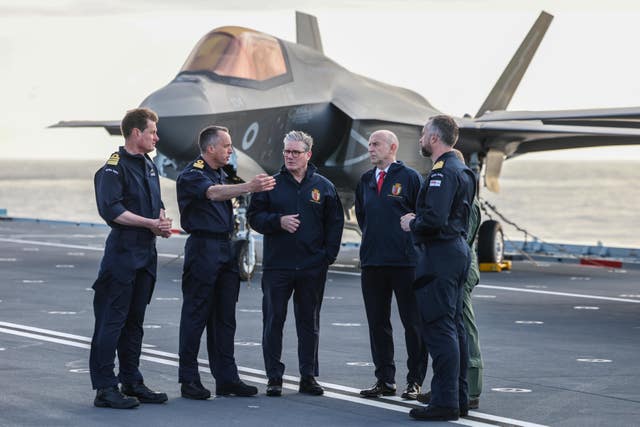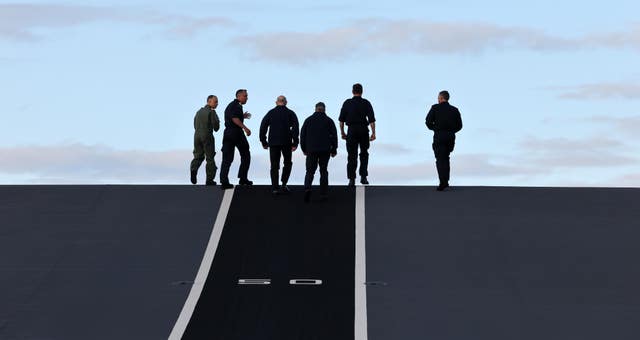Starmer warns of ‘new era’ of global insecurity during HMS Prince of Wales visit
The Prime Minister met sailors, aviators and soldiers during an overnight stay as the flagship aircraft carrier heads towards the Indo-Pacific.

The Prime Minister has warned the world is in a “new era” of global insecurity and uncertainty as he visited the UK’s flagship aircraft carrier.
Sir Keir Starmer met sailors, aviators, soldiers and Royal Marines onboard HMS Prince of Wales during an overnight stay as it heads towards the Indo-Pacific.
The vessel, which set off from Portsmouth on Tuesday, will travel to the Mediterranean, Middle East, south-east Asia, Japan and Australia on an eight-month voyage, accompanied by escort ships from international allies.

Speaking onboard the carrier, the Prime Minister said the mission showed the UK’s “leadership on global issues and security and defence” and was a sign of unity with allies, including Nato.
“We all know that the world is more uncertain than it felt a few months or years before – we’re in a new era,” Sir Keir told broadcasters.
During the tour, the Prime Minister, who was accompanied by Defence Secretary John Healey, watched from bridge as the F-35 warplanes were deployed.
They were shown around by Vice Admiral Andrew Burns, fleet commander of the Royal Navy, Commodore James Blackmore, commander of the UK Carrier Strike Group, Captain Will Blackett RN, the commander of the aircraft carrier, and Captain Colin McGannity RN, commander of the Carrier air group.
Sir Keir had spent the night onboard and told members of the crew he had been awoken at 2am by a siren which was part of a training exercise.
He also spoke with crew members in the junior ratings’ mess for breakfast where he was served a plate of baked beans and two slices of unbuttered white bread.
The Prime Minister does not eat meat and used to be a vegetarian but is now a pescatarian, also eating fish.
Meanwhile, the Defence Secretary tucked into bacon, sausage, two eggs and baked beans, accompanied by a large dollop of HP brown sauce.
The Carrier Strike Group also includes destroyer HMS Dauntless and frigate HMS Richmond along with warships from Norway and Canada.
The deployment comes as US President Donald Trump pushes for Nato allies to do more to provide their own defence.
The £3 billion carrier’s journey to the Indo-Pacific is also aimed at demonstrating the UK’s commitment to allies in the region nervous about China’s actions in relation to Taiwan and disputed sea lanes.

Around 4,000 UK military personnel from the Royal Navy, Army and RAF will join Operation Highmast, with allies from Spain and New Zealand also set to take part along with Norwegian and Canadian personnel.
Sir Keir said global insecurity was why the Government had committed to increasing defence spending to 2.5% of gross domestic product from April 2027.
“It’s hugely important for the UK to play a leading role, as we are playing on this deployment,” he said.
“It shows our capability, it shows our sense of global leadership on defence and security, but also on trade and the economy – we’re a free trading nation.
“The increased defence spending is the highest sustained increase since the Cold War.
“That’s necessary, necessary for security and our defence as a country, but really important that is measured and felt in good, secure, well paid jobs across the country.”
Indo-Pacific stability is also economically critical for the UK, with imports and exports in the region worth £286 billion – almost 20% of all UK trade.
A contingent of 18 UK F-35B jets will join the carrier in the days after departure, with that number increasing to 24 during the deployment.
Also joining will be Merlin Mk2 anti-submarine helicopters from RNAS Culdrose and Merlin Mk4 Commando and Wildcat helicopters from RNAS Yeovilton, as well as T-150 Malloy and Puma drones.





